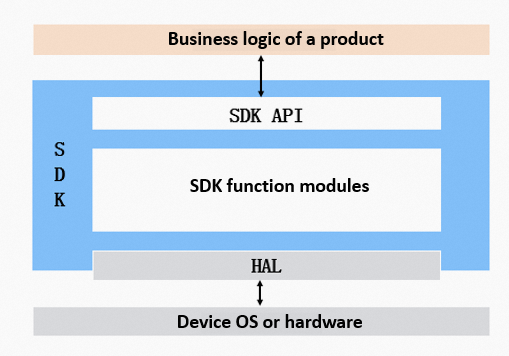Link SDK for C is suitable for devices whose business processing logic is programmed in C. The C programming language provides high-speed data processing and requires only a small amount of memory. The C programming language is used to develop the business processing logic of most Internet of Things (IoT) devices.
Obtain Link SDK for C
SDK 3.X
The latest version of Link SDK for C is 3.2.0. To download the latest version, go to the "Historical versions" section in this topic.
If you do not require the new features of the latest version, you can still use Link SDK for C V3.0.1 or V3.1.0 to configure devices without the need to upgrade the SDK.
If you use Link SDK for C V2.3.0 to configure devices and you want to upgrade the version to V3.0.1, you can go to Version history.
Usage notes
Link SDK for C provides multiple API operations that device manufacturers can call to establish communication between IoT Platform and devices and implement other auxiliary features, such as configuring Wi-Fi networks and performing remote control on on-premises devices.
Link SDK for C can be used in different operating systems, such as Linux, FreeRTOS, and Windows. Specific operations that require support from operating systems or hardware are defined as hardware abstraction layer (HAL) functions. When device manufacturers use Link SDK for C to configure devices, the manufacturers must implement the required HAL functions.
The following figure shows the relationships between the business logic of devices, Link SDK for C, and HAL functions.

The business logic of devices and HAL functions must be implemented by device manufacturers. The wrappers\os directory of a Link SDK for C package provides a file that contains sample HAL functions for your reference.
The first time you use IoT Platform, click Get started to learn how to connect a simulated device on Ubuntu to IoT Platform. This way, you can understand the basic concepts of IoT Platform.
SDK features
The following table describes the features of Link SDK for C V3.2.0.
Category | Feature |
Device-to-cloud connection |
|
Device identity verification |
|
TSL model | You can define features for devices, such as properties, services, and events, and perform the following operations on the features:
|
Region configuration in the cloud |
|
OTA | Firmware upgrades for devices |
Remote configuration | Device configuration file retrieval |
Sub-device management | You can add sub-devices to or remove sub-devices from a gateway. You can also manage sub-devices. |
Wi-Fi configuration | You can use one of the following methods to transfer the SSID or password of a Wi-Fi hotspot to a Wi-Fi device:
|
Remote control on local devices | In a private network, you can manage devices over CoAP. The following components are used: an Airline Control System (ALCS) server, an ALCS client installed on a device that you want to manage, a management console in which you can manage the device, and a gateway on which the management console is installed. |
Device binding | You can bind tokens to devices and maintain tokens. Tokens are used when devices are connected to IoT Platform over a Wi-Fi network or Ethernet to IoT Platform and managed by Living Link. |
Device shadow | You can store device data in IoT Platform for application queries. This prevents excessive latency that may be caused when data is obtained from devices. |
Reset | A device notifies IoT Platform to delete the device data when you perform a factory reset on the device. For example, the association between a device and a user or the relationship between a sub-device and a gateway may be deleted. |
Time retrieval | You can retrieve the current time from IoT Platform. |
File upload | You can upload files over HTTP. |
Historical versions
Version | Release date | Download link | Updates |
3.2.0 | 2020/03/03 | git clone https://github.com/aliyun/iotkit-embedded.git -b v3.2.0 |
|
3.1.0 | 2019/10/18 | git clone https://github.com/aliyun/iotkit-embedded.git -b v3.1.0 |
|
3.0.1 | 2019/03/15 | git clone https://github.com/aliyun/iotkit-embedded.git -b v3.0.1 |
|
2.3.0 | 2018/11/19 | git clone https://github.com/aliyun/iotkit-embedded.git -b v2.3.0 |
|
2.2.1 | 2018/09/03 | git clone https://github.com/aliyun/iotkit-embedded.git -b v2.2.1 |
|
2.2.0 | 2018/08/06 | git clone https://github.com/aliyun/iotkit-embedded.git-b v2.2.0 |
|
2.1.0 | 2018/03/20 | git clone https://github.com/aliyun/iotkit-embedded.git -b RELEASED_V2_1_20180320 |
|
2.0.3 | 2018/01/31 | git clone https://github.com/aliyun/iotkit-embedded.git -b RELEASED_V2.03 |
|
2.0.2 | 2017/11/30 | git clone https://github.com/aliyun/iotkit-embedded.git -b RELEASED_V2_02_20171130 |
|
2.0.1 | 2017/10/10 | git clone https://github.com/aliyun/iotkit-embedded.git -b RELEASED_V2_01_20171010 |
|
2.0.0 | 2017/08/21 | git clone https://github.com/aliyun/iotkit-embedded.git -b RELEASED_V2_00_20170818 |
|